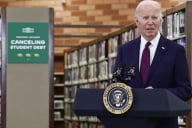You have /5 articles left.
Sign up for a free account or log in.
The academy has responded to COVID-19 largely as an institutional challenge, not, as one might have wished, as an opportunity to demonstrate higher education’s unmatched capacity to apply expertise, in real time, to a pressing societal problem.
College and university leadership has focused primarily on nuts and bolts: the practicalities of how to repatriate study abroad students, clear out dorms and shift classes online. Meanwhile, faculty scurry to move their classes online.
Without in any sense drawing attention away from the human toll that the virus is inflicting, we should also recognize that COVID-19 is an intellectual challenge. Wouldn’t it be valuable for the professoriate to transform, as much as possible, this disruption into a learning experience?
At best, the abrupt transition to online learning will result in a lot of unevenness. Some faculty will be able to move their courses online successfully, creating learning experiences that are roughly equivalent to those in a face-to-face class. But many classes will be beset by design flaws, delivery problems and technical snafus. An effective module, let alone multiple weeks of a course, can’t be built in a week.
What if there was a better way?
Let me suggest one.
What if individual institutions created campuswide MOOCs -- cMOOCs, not the xMOOCs associated with Coursera and edX -- in order to create a genuine online learning community that addressed coronavirus from multidisciplinary perspectives?
The goal of a cMOOC is to share knowledge, draw connections and bring a wide range of academic expertise to a topic that require fresh perspectives and novel insights. Coronavirus certainly fits the bill.
CMOOCs focus less on knowledge transmission through digitized lectures from an authority figure than on discussion and debate involving a wide range of participants. CMOOCs also offer nodes, where more specialized conversations take place on particular topics.
Our campuses have extraordinary expertise in topics connected with coronavirus. Biologists might speak on the molecular biology of viruses and epidemiologists about the incidence and spread of viruses. Biomedical scientists could examine the similarities and differences between Zika, Ebola, SARS, H1N1 (swine flu) and COVID-19.
Meanwhile, art historians could analyze representation of epidemics in art; historians about the impact of infectious diseases on the course of history; literary and media scholars on the depiction of illness in literature, theater and film; psychologists on anxiety and panic responses to disruption; political scientists on varied societal responses to coronavirus; and sociologists on the impact of the disruption on the lives of vulnerable and marginalized populations.
A crisis is a terrible thing to waste. Right now, it’s unclear whether the current disruption will spur the spread of online learning or produce a counterreaction, as large numbers of faculty members decide that teaching online is a terrible experience for their students and themselves.
But technology can make possible new kinds of networking possible, and all of us, whether artists, humanists, social and natural scientists, or specialists in education, law, nursing, social work and other professional fields of practice have a vested stake in figuring out how society should respond to COVID-19 and its short- and long-term implications.
In popular parlance, to call something “academic” is to dismiss it as impractical, irrelevant and of only theoretical interests. But for those of us who are academics, the term means the exact opposite. We know that scholarship and education are the keys to whether COVID-19 is addressed in an informed and reasonable way. Let’s model that in the way we educate our own students for the remainder of this semester.
Steven Mintz is senior adviser to the president of Hunter College for student success and strategic initiatives.







